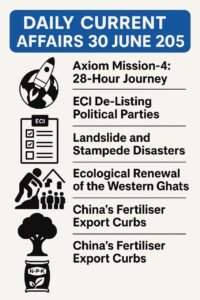Looking for the 30 June 2025 Current Affairs for your UPSC preparation? You’re in the right place. This comprehensive update covers 15 top UPSC-relevant topics from The Hindu, Indian Express, and PIB, including key facts for Prelims and insights for Mains. Each topic is explained in simple terms with focus on government schemes, international treaties, and real-world implications. Master your 30 June 2025 Current Affairs with this all-in-one revision guide!
UPSC GS Syllabus 2025 – Mains Paper-Wise Breakdown- click
watch video – click

1. Why Did Axiom-4 Take 28 Hours to Reach the ISS?
What’s the News?
Group Captain Shubhanshu Shukla, an Indian Air Force officer, made history by becoming the first Indian to set foot on the International Space Station (ISS). He was part of Axiom Mission-4 (Ax-4) launched by SpaceX. Interestingly, the mission took 28 hours to dock, which is longer than usual.
Key Points for UPSC:
-
Mission: Axiom Mission-4 (Ax-4)
-
Astronaut: Group Captain Shubhanshu Shukla (First Indian to board ISS)
-
Launch Vehicle: SpaceX Crew Dragon, Falcon 9
-
Docking Duration: 28 hours (usually 6–8 hours)
Why the Delay?
-
Orbital Mechanics: Launch timing must align with ISS orbit.
-
Docking Port Congestion: ISS had limited ports available.
-
Safety Protocols: Slower approach ensures safety of astronauts.
Global Context:
-
Growing private participation (Axiom Space, SpaceX).
-
NASA, ESA, Roscosmos, and others now share space with private actors.
-
Such missions expand future global cooperation in lunar and Mars missions.
Relevant Treaties:
-
Outer Space Treaty (1967) – peaceful use of space; India is a signatory.
-
Artemis Accords (India joined 2023) – promotes peaceful space collaboration.
Implications:
-
Big boost for India’s space diplomacy and human spaceflight readiness.
-
Supports India’s upcoming Gaganyaan Mission (2025).
-
Enhances STEM engagement and aerospace R&D.
2. ECI’s Delisting of Political Parties
What’s the News?
The Election Commission of India (ECI) recently removed over 250 inactive or non-compliant political parties from its register, citing violations of transparency and accountability norms.
Key Points for UPSC:
-
Law Involved: Section 29A, Representation of the People Act, 1951
-
Violations:
-
Not filing audit reports.
-
Not contesting elections.
-
Suspected misuse for money laundering or tax evasion.
-
National & Global Context:
-
India has over 2,500 registered political parties, many defunct.
-
In the US & UK, strict norms ensure funding and electoral compliance.
Relevant Provisions:
-
Article 324: Powers of ECI.
-
Income Tax Act, 1961: Tax exemptions for political parties.
-
SC Judgments: Emphasize clean politics and transparency.
Implications:
-
Enhances electoral credibility.
-
Removes shell parties used for illegal activities.
-
Encourages ethical political participation.
3. Boeing Faces Crisis: Safety, Trust, and Competition
What’s the News?
Aircraft giant Boeing is under scrutiny due to recent technical faults and past crashes. At the same time, Airbus is gaining market share, especially in fast-growing aviation markets like India.
Key Points for UPSC:
-
Boeing 737 MAX crashes (2018–19): Led to worldwide grounding.
-
Recent technical issues: Alaska Airlines door panel failure.
-
Airbus now dominates orders from Air India and IndiGo.
Global Aviation Oversight:
-
FAA (USA) and EASA (EU) have intensified inspections.
-
India’s DGCA is reviewing safety checks on imported planes.
Legal Frameworks:
-
Chicago Convention (1944): Governs global civil aviation.
-
ICAO standards: Set benchmarks for airworthiness.
Implications:
-
Aviation Safety becomes crucial in India’s expanding air network.
-
Opportunity for Make in India in aircraft production.
-
Airlines diversifying to avoid overdependence on one manufacturer.
4. 50 Years of Emergency: Remembering Forced Sterilisation
What’s the News?
June 2025 marks 50 years since the Emergency (1975–77), which witnessed one of the most coercive mass sterilisation campaigns in world history.
Key Points for UPSC:
-
Over 6 million men sterilised in 1976–77 under population control drive.
-
Sanjay Gandhi spearheaded the aggressive campaign.
-
Sterilisation often done under coercion or threats of ration/job denial.
Global Comparison:
-
China’s One-Child Policy had similar coercive controls.
-
USA, Sweden also had eugenic practices historically.
Legal & Ethical References:
-
Article 21: Right to life and bodily integrity.
-
Puttaswamy Judgment (2017): Right to privacy includes reproductive freedom.
-
NHRC Guidelines: Oppose forced medical interventions.
Implications:
-
Emphasizes voluntary family planning.
-
Shapes India’s rights-based population policy post-Emergency.
5. Digital Search Powers Under the Proposed I-T Bill 2025
What’s the News?
The proposed Income Tax Bill 2025 has raised privacy concerns due to expanded powers to search digital devices without robust judicial safeguards.
Key Points for

-
I-T officials may get powers to access phones, cloud, emails.
-
Critics highlight risks of overreach, surveillance, and misuse.
Global Practices:
-
USA: Digital access requires court warrants (4th Amendment).
-
EU: Strong protections under GDPR.
Legal Backdrop:
-
Puttaswamy Case (2017): Upheld digital privacy as part of Article 21.
-
Data Protection Act, 2023: Focuses on consent-based digital governance.
Implications:
-
Could affect public trust and investor confidence in digital economy.
-
Balance needed between revenue enforcement and civil liberties.
6. One Year Since India’s New Criminal Laws Replaced Colonial Codes
What’s the News?
In 2023, India replaced the colonial criminal laws—IPC, CrPC, and Evidence Act—with three new laws:
-
Bharatiya Nyaya Sanhita (BNS)
-
Bharatiya Nagarik Suraksha Sanhita (BNSS)
-
Bharatiya Sakshya Adhiniyam (BSA)
Key Points for UPSC:
-
IPC → BNS: Defines new crimes like mob lynching, terrorism.
-
CrPC → BNSS: Introduces e-FIRs, zero FIRs, community policing.
-
Evidence Act → BSA: Recognizes digital and electronic evidence.
Institutional Input:
-
Based on Law Commission, Malimath, and Madhav Menon Committee recommendations.
Implications:
-
Modernises India’s criminal justice system.
-
Challenges: Need for police and judicial training, tech infrastructure.
7. Language of Unity: Debate on Hindi and Regional Languages
What’s the News?
The government is promoting Hindi and regional languages in education and official work to foster unity, triggering debate on linguistic federalism.
Key Points for UPSC:
-
NEP 2020: Encourages mother tongue till Class 5.
-
Three-Language Formula: Hindi, English, and regional language.
Constitutional Provisions:
-
Article 343: Hindi as official language.
-
Article 351: Promotes development of Hindi.
-
Article 29 & 30: Protect minority language rights.
Global Examples:
-
China: Mandarin promoted as national language.
-
South Africa: 11 official languages ensure inclusivity.
-
EU: 24 official languages protected under EU law.
Implications:
-
Promotes unity through diversity.
-
Must balance between integration and regional autonomy.
-
Boosts local education outcomes and inclusiveness.
8. Twin Disasters: Landslide in Uttarakhand & Stampede in Odisha
What’s the News?
-
A deadly landslide occurred during Char Dham Yatra in Uttarakhand.
-
A tragic stampede happened during the Rath Yatra in Puri, Odisha.
Key Points for UPSC:
-
Disaster Types:
-
Landslide – natural disaster.
-
Stampede – man-made disaster.
-
-
Key Vulnerabilities:
-
Weak infrastructure in hilly areas.
-
Ineffective crowd control during large religious gatherings.
-
-
Events Involved:
-
Char Dham Yatra: Kedarnath, Badrinath, Yamunotri, Gangotri.
-
Rath Yatra: Annual procession attracting lakhs of pilgrims.
-
Global Context:
-
Similar to the 2015 Hajj stampede in Saudi Arabia.
-
Climate change and unregulated tourism increase disaster risk worldwide.
Legal Frameworks:
-
Disaster Management Act, 2005
-
Sendai Framework for Disaster Risk Reduction (2015–2030)
Implications:
-
India: Needs advanced early warning systems, digital crowd monitoring, and local-level disaster plans.
-
Global: Highlights the universal need for integrating climate adaptation with cultural event safety.
9. Ecological Renewal of the Western Ghats
What’s the News?
-
Emphasis on democratic decentralisation to conserve the ecologically rich Western Ghats.
Key Points for UPSC:
-
Western Ghats:
-
One of the world’s 8 hottest biodiversity hotspots.
-
Threats: Deforestation, urbanisation, habitat fragmentation, and climate stress.
-
Solution: Strengthen local governance (Gram Sabhas, Panchayats) for eco-restoration.
Global Context:
-
Kasturirangan Committee: Advocated protection of Ecologically Sensitive Areas (ESAs).
-
Madhav Gadgil Committee: Recommended community-based conservation.
Conventions:
-
Convention on Biological Diversity (CBD)
-
Paris Agreement (Climate Mitigation and Resilience Goals)
Implications:
-
Local community empowerment is key to balancing development and conservation.
-
Aligns with India’s global climate targets and biodiversity commitments.
10. National Commission for Women (NCW)
What’s the News?
-
NCW’s structure, powers, and effectiveness are being reviewed for strengthening gender justice.
Key Points for UPSC:
-
Established: 1992, under NCW Act, 1990.
-
Mandate:
-
Safeguard women’s legal and constitutional rights.
-
Conduct inquiries, issue recommendations, and suggest legal reforms.
-
-
Suo motu Powers: Can act on its own in women’s rights violation cases.
Implications:
-
Need to strengthen enforcement capacity.
-
Ensure synergy with State Women Commissions.
-
Mainstream gender perspectives into policymaking and budgeting.
11. China’s Fertiliser Supply Squeeze
What’s the News?
-
China has reduced fertiliser exports, affecting Indian agriculture due to heavy dependency.
Key Points for UPSC:
-
Fertilisers Impacted: Urea, DAP (Di-Ammonium Phosphate), Potash.
-
India’s Dependency: Relies on China and others for large-scale imports.
-
Issue: Leads to costlier farming, threatens food security, and burdens the subsidy system.
Global Context:
-
China’s restrictions are aimed at domestic price stability and food security.
-
Other developing economies are also facing input shortages.
Government Initiatives:
-
Nutrient-Based Subsidy (NBS) Scheme.
-
PM-PRANAM Scheme – Promotes organic alternatives.
Implications:
-
Urges India to boost indigenous fertiliser production.
-
Encourages the shift to organic and nano-based fertilisers.
12. GPS Interference & Navigation Warfare
What’s the News?
-
Increased GPS jamming/spoofing in global conflict zones is raising concerns about navigational safety.
Key Points for UPSC:
-
What Is GPS Interference?:
-
Jamming = signal blockage.
-
Spoofing = false signals sent to mislead receivers.
-
-
Areas Affected: Military ops, aviation, shipping, civilian telecom.
Major Navigation Systems:
-
GPS (USA)
-
GLONASS (Russia)
-
Galileo (EU)
-
BeiDou (China)
-
NavIC (India) – India’s indigenous navigation system for strategic independence.
Implications:
-
India must strengthen satellite cybersecurity.
-
Broader adoption of NavIC is essential for strategic autonomy.
13. Synthetic Genome Breakthrough
What’s the News?
-
Scientists have successfully created a synthetic human-like genome, simulating nature’s DNA in labs.
Key Points for UPSC:
-
Synthetic Genome: Lab-constructed DNA sequences mimicking real genes.
-
Applications:
-
Gene therapy
-
Drug development
-
Climate-resilient crops
-
-
Concerns: Bioethics, misuse in biowarfare, cloning fears.
Global Context:
-
Countries like USA and China are leading in synthetic biology.
-
Follows earlier breakthroughs like CRISPR gene editing.
Relevant Regulations:
-
UNESCO Declaration on Bioethics
-
Cartagena Protocol on Biosafety (part of CBD)
Implications:
-
India must:
-
Build bioethics laws.
-
Promote safe biotechnology innovation.
-
Invest in biotech education and research.
-
15.India Declared Trachoma-Free by WHO
What’s the News?
-
WHO certified India as Trachoma-free, meaning the disease is no longer a public health concern.
Key Points for UPSC:
-
Trachoma: Eye infection that can cause blindness; spread via poor hygiene.
-
Elimination Strategy: India followed WHO’s SAFE approach:
-
Surgery
-
Antibiotics
-
Facial hygiene
-
Environmental improvements
-
Supporting Schemes:
-
National Programme for Control of Blindness
-
Swachh Bharat Abhiyan (improved sanitation)
Global Recognition:
-
Countries like Mexico and Cambodia have also eliminated trachoma.
Implications:
-
Enhances India’s global health leadership.
-
Shows success of community-driven public health efforts.
